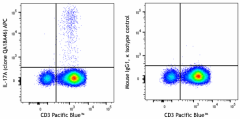- Clone
- QA18A46 (See other available formats)
- Regulatory Status
- RUO
- Other Names
- Interluekin 17A, IL-17, CTLA8
- Isotype
- Mouse IgG1, κ

-

Human peripheral blood lymphocytes were stimulated with Cell Activation Cocktail (with Brefeldin A) (Cat. No. 423304). Cells were surface stained with anti-human CD3 Pacific Blue™, then fixed, permeabilized, and intracellularly stained with anti-human IL-17A recombinant (clone QA18A46) APC (left) or mouse IgG1, κ APC isotype control (right).
| Cat # | Size | Price | Quantity Check Availability | ||
|---|---|---|---|---|---|
| 385903 | 25 tests | $155.00 | |||
| 385904 | 100 tests | $360.00 | |||
IL-17A is the founding member of the IL-17 family, a group of six structurally related pro-inflammatory cytokines. IL-17A is the signature cytokine of Th17 subpopulation of CD4+ T cells. Neutrophils are also a major source of IL-17A. IL-17A can elicit multiple biological activities on a variety of cells. For instance, IL-17A can induce IL-6, IL-8, G-CSF, and PGE2 production from epithelial cells, endothelial cells, or fibroblast. IL-17A also further regulates neutrophil functions. Human IL-17A shares 63%, 63% and 72% amino acid sequence similarity to rat IL-17A, mouse IL-17A, and a protein encoded by the ORF13 gene of herpesvirus Saimiri (HVS) respectively.
Product Details
- Verified Reactivity
- Human
- Antibody Type
- Recombinant
- Host Species
- Mouse
- Formulation
- Phosphate-buffered solution, pH 7.2, containing 0.09% sodium azide and BSA (origin USA)
- Preparation
- The antibody was purified by affinity chromatography and conjugated with APC under optimal conditions.
- Concentration
- Lot-specific (to obtain lot-specific concentration and expiration, please enter the lot number in our Certificate of Analysis online tool.)
- Storage & Handling
- The antibody solution should be stored undiluted between 2°C and 8°C, and protected from prolonged exposure to light. Do not freeze.
- Application
-
ICFC - Quality tested
- Recommended Usage
-
Each lot of this antibody is quality control tested by immunofluorescent staining with flow cytometric analysis. For flow cytometric staining, the suggested use of this reagent is 5 µL per million cells in 100 µL staining volume or 5 µL per 100 µL of whole blood. It is recommended that the reagent be titrated for optimal performance for each application.
- Excitation Laser
-
Red Laser (633 nm)
- Application Notes
-
Clone QA18A46 can completely block the binding of clone BL168 on target cells.
- RRID
-
AB_3068058 (BioLegend Cat. No. 385903)
AB_3068058 (BioLegend Cat. No. 385904)
Antigen Details
- Structure
- ~15 kD cytokine
- Distribution
-
Activated T cells, neutrophils
- Function
- Proinflammatory cytokine
- Ligand/Receptor
- IL-17A receptor
- Cell Type
- Lymphocytes, Neutrophils, T cells, Th17
- Biology Area
- Adaptive Immunity, Immunology, Innate Immunity
- Molecular Family
- Cytokines/Chemokines
- Antigen References
-
- Spriggs MK. 1997. J Clin Immunol. 17:366-9.
- Kawaguchi M, et al. 2004. J Allergy Clin Immunol. 114:1265-73.
- Furuzawa-Carballeda J, et al. 2007. Autoimmun Rev. 6:169-75.
- Gene ID
- 3605 View all products for this Gene ID
- UniProt
- View information about IL-17A on UniProt.org
Other Formats
View All IL-17A Reagents Request Custom Conjugation| Description | Clone | Applications |
|---|---|---|
| Purified anti-human IL-17A Recombinant Antibody | QA18A46 | ICFC |
| APC anti-human IL-17A Recombinant Antibody | QA18A46 | ICFC |
| PE anti-human IL-17A Recombinant Antibody | QA18A46 | ICFC |
Compare Data Across All Formats
This data display is provided for general comparisons between formats.
Your actual data may vary due to variations in samples, target cells, instruments and their settings, staining conditions, and other factors.
If you need assistance with selecting the best format contact our expert technical support team.
-
Purified anti-human IL-17A Recombinant Antibody

Human peripheral blood lymphocytes were stimulated with Cell... -
APC anti-human IL-17A Recombinant Antibody

Human peripheral blood lymphocytes were stimulated with Cell... -
PE anti-human IL-17A Recombinant Antibody

Human peripheral blood lymphocytes were stimulated with Cell...
